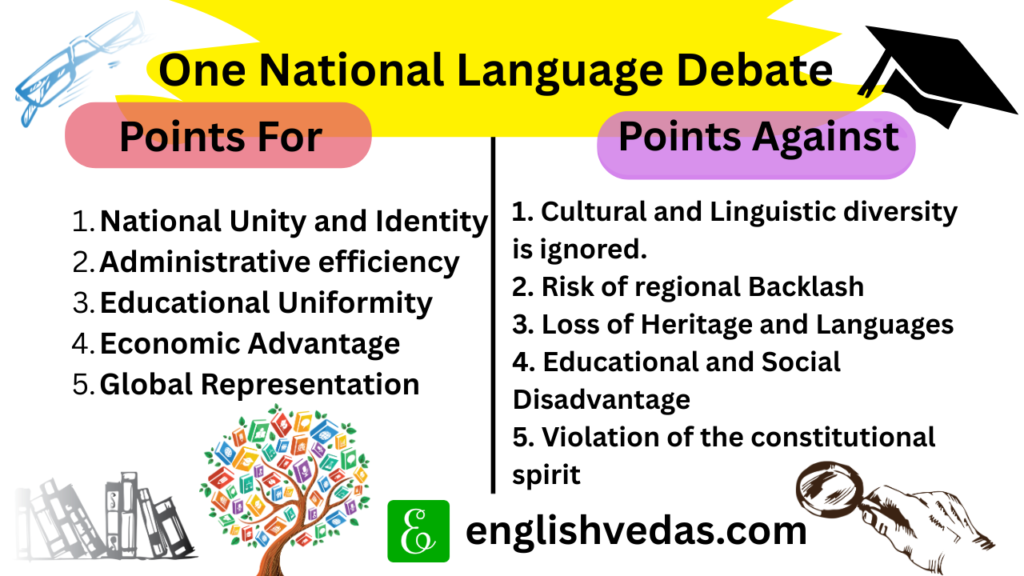The debate on one national language is one of the most controversial debate. The debate is of key importance as the Indian constitution does not designate one language as the national language. Hindi and English are considered as official languages. Let us discuss the five points for and against one national language.
India never considered Hindi as a national language. The three-language formula is not accepted in some states like Tamil nadu.
Language is a sensitive issue. For some it is a question of life and death. The states are divided into languages. India is a nation in which linguistic pluralism is appreciated. Culture is linked to language. In India Hindi is the language of 10 states. India recognizes 22 languages in the 8th schedule of the constitution. States are free to adopt their own language. However, Hindi is still the most widely spoken language.

Points for One National Language in India
1. National Unity and Identity
- One language leads to shared history, culture, and values among citizens.
- Language is intertwined with personal identity.
- People can express their thoughts and feelings to survive in this world.
- It becomes easier for people to find a place in this world.
2. Administrative efficiency
- One language simplifies governance and legal documentation.
- It also builds a transparent legal system.
- Legal information is accessible to the general public without translation hassles.
- No conflicting interpretation of the legal document.
- Citizens become more law-abiding.
- One language fosters trust between citizens and unifies them.
3. Educational Uniformity
- One language creates more learning opportunities for students.
- It helps in standardizing education by making a standardized curriculum.
- Students can concentrate on improving vocabulary and making more complex sentence structure.
- The learning outcomes across different regions become consistent.
4. Economic Advantage
- One language helps businesses and job markets to operate more smoothly.
- It also reduces transaction costs and communication barriers.
- When people share a common language it becomes easier to match workers with jobs.
- One language leads to reduction in transaction costs, hence increases employability.
- It facilitates negotiation in trade and businesses.
5. Global Representation
- Language gives a distinct linguistic identity to a country. For example, French in France, Japanese in Japan, etc.
- It promotes cultural exchange between countries and streamlines international interactions.
- People travel, work, and live in different countries with their own cultural identity, which promotes their culture at a global level.
Points Against One National Language in India
1. Cultural and Linguistic Diversity Is Ignored.
- 22 official languages and over a thousand dialects could marginalize many countries.
- If there is one national language, then the native language takes a backseat.
- There is an overall cultural erasure as the literature and tradition of that region are ignored.
- People take pride in their linguistic heritage, so their sentiments are hurt when one language is imposed.
2. Risk of Regional Backlash
- A chosen national language which is not native is opposed by people. For example, in the state of Tamil Nadu, people who come to the state to earn a living cannot be forced to learn a language other than their mother tongue.
- For instance, Tamil Nadu doesn’t accept Hindi as an official language.
- In Bengal, people speak Bengali, in Odisha, people speak Oriya, in Karnataka, people speak Kannada, and are comfortable speaking their regional language; hence, forcing them to speak Hindi would lead to tensions within the state.
3. Loss of Heritage and Languages
- Ancient Indian language is rich, and it imbues the cultural practices and identity of a region.
- A regions history, rituals, traditional songs and stories are lost if one language is made mandatory.
- Languages are closely linked to heritage if there is one national language it would develop a sense of alienation for their cultural identity is lost.
- People will not be able to relate to the world and will lose understanding.
4. Educational and Social Disadvantage
- Children who are from a non-native language may struggle to learn.
- It would also lead to social inequalities among people.
- People are from minority language backgrounds feel isolated.
- With one national language, social mobility increases, and it increases job opportunities for people.
- When students are taught in a language other than their mother tongue, they feel neglected, and this results in disengagement. Further, it may increase the dropout rate in schools.
5. Violation of the Constitutional Spirit
- The constitution promotes linguistic equality.
- It accepts multiple languages to respect India’s pluralism.
- One national language would lead to the disappearance of regional languages.
- Article 350 A mandates the provision of facilities for instruction in the mother tongue at the primary stage of education.
- Article 29 (1) guarantees the right of a citizen to conserve their distinct language and culture.
These were the points for and against the one national language.
English Vedas Blog
Happy Learning!
Also Read:-
- Exploring the Controversial Debate on Social Media Vetting in Today’s Digital Age: 4 Points
- National Education Policy 2025: The Great Debate—Points For and Against
- Homework: Should It Be Banned or Not? 5 Reasons for the Debate

Written by Sukhjit Kaur, English educator with 17+ years of experience helping students master grammar and writing. Through EnglishVedas.com, she simplifies English grammar using examples from daily life and classrooms.
